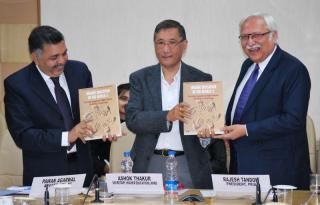Seminar on “Community Engagement in Higher Education” and launch of the GUNi World Report 5 on Higher Education
On the 5th of March’ 2014, a seminar on “Community Engagement in Higher Education”, was held at the Planning Commission in New Delhi. The Seminar witnessed participation from the academia, government and NGOs. The event hosted by Sh Pawan Agarwal, Advisor (Education), included the participation of 11 universities across India, through video conferencing, who, apart from participating in the deliberations, also shared the their story of community engagement, which were being practiced in their respective universities.

Click here for a slideshow of event photos image #1 image 2 image 3 image 4 image 5 image 6 image 7 image 8 image 9 image 10 image 11 image 12 image 13 image 14 image #15 image #16
The event started with a welcome note by Sh Pawan Agarwal. He reminded the participants that the 12th Plan has incorporated a new initiative on social responsibility in higher education.
He then invited Dr Rajesh Tandon, Co-Chair, UNESCO Chair in Community Based Research and Social Responsibility in Higher Education, who set the stage for the deliberations, by elaborating on the essence of the theme of community engagement. Dr Tandon also introduced the GUNi World Report on Higher Education titled, “Knowledge, Engagement and Higher Education: Contributing to Social Change”, and provided a brief on its contents and the message it conveyed. This introduction was followed by speeches from the special guests at the event, Dr Michael Osborne (Chair & Professor, University of Glasgow, UK), Dr Emma McKenna (Science Shop Co-ordinator, Queen’s University’ Belfast; & Workpackage Leader on the Public Engagement with Research and Research Engagement with Society (PERARES) project) and Dr Jennifer Chambers (Senior Policy Manager, Research Councils, UK).
Dr Osborne spoke about the role of PASCAL Observatory in promoting community engagement, through various initiatives such as the PURE (PASCAL Universities Regional Engagement ) project, along with elaborating the economic, social, cultural and environmental forms of community engagement. Dr McKenna spoke about her role and range of activities she undertook as the Science Shop Co-ordinator, at the Queen’s University’ Belfast. She elaborated on the ways in which the Science Shop sought to promote community engagement and community based research, by employing students to undertake research in collaboration with the communities. She also briefed the audience about the PERARES project, which looked at mechanisms to involve Civil Society Organizations (CSOs) in the European Commission in research processes. Dr Chambers, being at a senior managerial post in the Research Councils, UK, emphasized on how the “impact” of a particular project was given due recognition, when being considered for funding, thereby promoting engagement opportunities. Dr Chambers also spoke about the National Co-ordinating Centre for Public Engagament (NCCPE), which has been supporting universities, in taking up engagement activities and opportunities.
Following the speeches by the UK speakers, the other participants too shared their view points and experiences on the theme. Among them were Sh Amit Khare, Joint Secretary, MHRD, emphasized that engagement has to be a two-way process and must be an integral part of learning and credits for students and faculty alike.
Dr Pankaj Mittal, VC, Bhagat Phool Singh Mahila Vishwavidyalaya shared the experiences of her university in supporting women’s livelihood and empowerment in Haryana. Mr Shigeruaoyagi, Director, UNESCO (Delhi office) made a strong plea for viewing community engagement as a part of lifelong learning framework. Prof Anand of Dayalbagh University underscored the value of dignity of labour to be inculcated amongst students.
Along with them, representatives from 10 universities, across the country, also shared their views. They were: Avinashilingam University; NIT, Surat; NITTTR, Bhopal; Central University, Himachal Pradesh; IARI, New Delhi; IISER, Pune; NIT, Trichy; IISER, Mohali; Dayalbagh Educational Institute and IIT, Patna. Apart from the academic sector, other organization such as PRADAAN, UNESCO and IRRAD also shared their experiences.
The deliberations and discussions finally culminated in the GUNI report being released by Sh. Ashok Thakur, Secretary (Higher Education, MHRD), amidst a loud round of applause by the participants. He emphasized on the importance of integration of indigenous knowledge systems with the elitist knowledge residing in the universities, and applauded such efforts, which promoted this cause. He also underlined the importance community engagement, by saying that “Only through getting to the pulse of the people, we will be able to attune our education system”. He also brought to the notice of the participants, the policy changes, which were lined up to promote the cause of community engagement, an example of which was the special amendment to the IIT Act, which mandated working for the community, as an essential exercise for earning credits by the students. Along with this, in order to promote socially relevant research, he said that the government has also made accreditation of colleges/universities mandatory, which would have community engagement as one of the defining criterions, for academic ranking. He also called for NGOs to work closely with universities, in taking forward this initiative, taking a cue from PRIA, which leads from the front.
Dr Tandon provided his concluding remarks to the seminar by saying that “My agenda is to mobilize my fraternity of NGOs, in this field of community engagement, along with ensuring the mutuality of the benefits of the work done, and its linkage with the core academic curriculum in the Universities”.
 Printer-friendly version
Printer-friendly version- Rajesh Tandon's blog
- Login to post comments
- 126 reads




